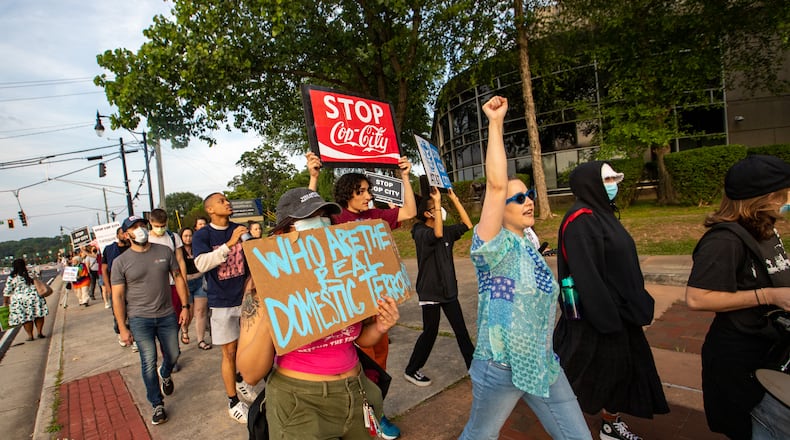A coalition of national civil rights organizations have raised concern to the federal government about the phrase “domestic violent extremism” that has been used to justify arrests of opponents of Atlanta’s public safety training center.
In a letter to U.S. Secretary of Homeland Security Alejandro Mayorkas, the American Civil Liberties Union, NAACP Legal Defense Fund, Brennan Center for Justice and Center for Constitutional Rights warned of the potential negative impacts that the department’s classifications have on local communities.
Arrest warrants for dozens of people affiliated with the Defend the Atlanta Forest group, and three individuals who operate a charity that provided bail money for protestors, all have similar language tying the movement to extremist behavior.
The three individuals arrested in May had their home raided by a SWAT team and are charged with financial crimes.
The Department of Homeland Security later confirmed to The Atlanta Journal-Constitution that the “domestic violence extremists” designation does not exist.
In the letter dated Thursday, civil rights organizations argue that “lax DHS standards and intelligence practices” have contributed to unconstitutional arrests of protestors including opponents of the controversial project.
“DHS’s use of ‘domestic violent extremism’ to describe groups opposed to Cop City is contributing to a false narrative that individuals engaged in lawful protest are a national security threat,” the letter reads. “Thus risking heightened aggressive policing of protesters.”
Many Democrats in Georgia have previously voiced concern over the domestic terrorism charges against more than 40 protesters associated with demonstrations or organizing against the training center.
Both U.S. Sens. Raphael Warnock and Jon Ossoff said they were troubled by the optics around the May arrests of three bail fund organizers.
The Georgia Bureau of Investigation and Atlanta Police Department raided the well-known property known as the Teardown House just days before City Council was slated to vote on funding for the training center.
“These tactics, coupled with the limited public information provided so far, can have a chilling effect on nonviolent, constitutionally-protected free speech activities those of us in the fight for justice have been engaged in for years,” Warnock said at the time.
The ACLU and other groups said that the Department of Homeland Security’s spotty use of the “domestic violent extremists” language is being improperly used by state and local law enforcement agencies to rationalize questionable arrests.
From December 2022 to May 2023, they say, Georgia’s public safety agencies obtained at least 17 warrants based on affidavits describing Defend the Atlanta Forest as “a group classified by the United States Department of Homeland Security as Domestic Violent Extremists.”
“These affidavits — which targeted protesters, a legal observer, and three operators of a nonprofit bail fund — were incorrect,” the letter says.
The group requested the federal agency publicly disclose all its communications with Georgia state and local law enforcement and withdraw all online information related to opponents of the training center.
They also called for the Office of the Inspector General to investigate the department’s “collection and dissemination” of reports that label Georgia protesters as “domestic violent extremists.”
About the Author
Keep Reading
The Latest
Featured


